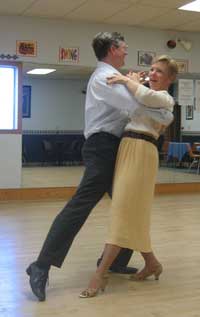 Round Dancing is Choreographed Ballroom
Round Dancing is Choreographed Ballroom
Round Dancing is a great couple activity. Learn more below.

About Dance
To read the full article above and many other educational articles on how to dance more smoothly and comfortably, see this TOC.
- Find step-by-step descriptions of figures in some 20 different dance rhythms.
- refresh your memory of steps you've done
- learn new figures
- Round Dance figures and sequences work beautifully on the freestyle ballroom floor.
- learn some new steps
- add variety and interest to your dancing
- Go beyond the steps to some of the details of what you can do with the rest of your body.
- dance position
- lead and follow
- body position and movement
- head
- torso
- arms and hands
- hips
- knees
- feet
- styling
- Get ideas for dancing more smoothly and comfortably.
- Try out the basic steps for some of the more exotic rhythms.
- samba
- mambo
- tango
- hustle
Some steps are simple and can be taken right out onto the dance floor. Others are more involved and will take time and experimentation to work out, but mastering new routines is fun and satisfying.